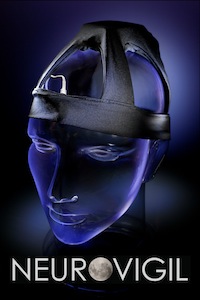 NeuroVigil, the La Jolla, Calif.-based neurotechnology company that created the non-invasive iBrain wireless EEG sensor, announced Monday that it had closed on its first round of venture financing. The unspecified investment was led by "an anonymous American industrialist and technology visionary, with participants distributed across the U.S. West and East coasts," the company says in a press release.
NeuroVigil, the La Jolla, Calif.-based neurotechnology company that created the non-invasive iBrain wireless EEG sensor, announced Monday that it had closed on its first round of venture financing. The unspecified investment was led by "an anonymous American industrialist and technology visionary, with participants distributed across the U.S. West and East coasts," the company says in a press release.
NeuroVigil spokeswoman Kathleen Murray responded to a series of e-mailed questions with a form letter declining to provide any additional details about the investment.
The press release does indicate that Dr. Howard Morgan, of venture fund First Round Capital, and Silicon Valley technology investor Alexis Flint are advisors to NeuroVigil founder Dr. Philip Low and investors in the company.
NeuroVigil's press release claims that the investment round puts the company's valuation at twice the combined valuations of both Google and Facebook back when they each received their initial rounds of funding. Fast Company did the back-of-the-envelope calculation on it: "Facebook's Series A funding in May 2005 was at $12.7 million, valuing the firm at $98 million. Some figure put the series Series A funding of Google, on a $25 million co-investment from Sequoia and Kleiner Perkins, at $75 million in late 1999... it would seem NeuroVigil got tens of millions in early cash, enough for a valuation of roughly $250 million."
The iBrain, NeuroVigil and Low have garnered numerous accolades since Low founded the company while a graduate student at the Salk Institute for Biological Studies, also in La Jolla. (The press release says Low invented the iBrain in 2009, although NeuroVigil won the $250,000 prize in the Draper Fisher Jurvetson Venture Challenge another $30,000 in prize money in a UC San Diego Entrepreneurship Challenge in 2008). Last year, NeuroVigil won the annual CONNECT Most Innovative New Product Award in Life Sciences.
As MobiHealthNews reported, Low presented the technology at TEDMED 2009. Around the same time, NeuroVigil signed a deal to provide Swiss pharmaceutical company Roche with iBrain sensors to help researchers collect and analyze data during clinical trials for drugs to treat neurological disorders.
In March, NeuroVigil also made Fast Company magazine's list of 10 Most Innovative Companies in Health Care. "The company's iBrain headband, worn at night, uses wireless electrodes to capture brainwaves. NeuroVigil's software interprets the data to produce a map of activity during sleep that's richer than anything previously available. Such tech could both help researchers identify biomarkers for early diagnosis of cognitive disorders (such as Parkinson's) and reveal how drugs affect the brain, a crucial step toward personalized medical treatment," Fast Company explained.
According to NeuroVigil, the iBrain "leverages the dynamic oscillations produced during sleep in order to systematically scan the brain for signs of pathologic activity years in advance of cognitive or behavioral symptoms."
At this year's HIMSS conference in Orlando, Fla., Robin Felder, associate director of clinical chemistry and toxicology and a pathology professor at the University of Virginia, said existing, wired polysomnography technology for measuring sleep patterns isn't natural and thus could produce inaccurate readings. “We’re going to wire you up, now get a good night’s sleep,” Felder joked.













